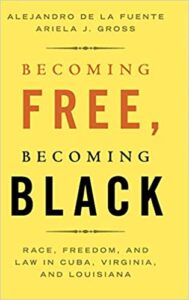In Print: Becoming Free, Becoming Black: Race, Freedom, and Law in Cuba, Virginia, and Louisiana

Becoming Free, Becoming Black: Race, Freedom, and Law in Cuba, Virginia, and Louisiana
Cambridge University Press, 2020
Summary: How did Africans become “blacks” in the Americas? Becoming Free, Becoming Black tells the story of enslaved and free people of color who used the law to claim freedom and citizenship for themselves and their loved ones. Their communities challenged slaveholders’ efforts to make blackness synonymous with slavery. Looking closely at three slave societies—Cuba, Virginia, and Louisiana—Alejandro de la Fuente and Ariela J. Gross demonstrate that the law of freedom—not slavery—established the meaning of blackness in law. Contests over freedom determined whether and how it was possible to move from slave to free status and whether claims to citizenship would be tied to racial identity. Laws regulating the lives and institutions of free people of color created the boundaries between black and white, the rights reserved for white people, and the degradations imposed only on black people.
Praise: “At a moment when ‘Send Them Back’ has reemerged as a nativist rallying cry, Becoming Free, Becoming Black is a brilliantly lucid guide to the deep history of how race and ethnic origin came to be potent ciphers for civic belonging. …De la Fuente and Gross show that brutality lay not merely in the imposition of slavery, but in the creation of racial regimes ranking black bodies even once freed from bondage. If enslavement is construed as an external political constraint, the project of freedom becomes focused on unshackling bodies from those confines. But if white means free and black means slave, then political status is embodied, innate and inescapable. …To this day, the legacy of free-but-not-full-citizen delimits quietly powerful hierarchies in our varying capacities to travel, vote, mix socially, run a business, hold public office, and intermarry. This indispensable book shows how knowing the past might aid us to intelligently reform our future.” —Patricia J. Williams, columnist, The Nation magazine
